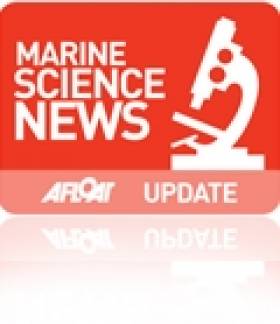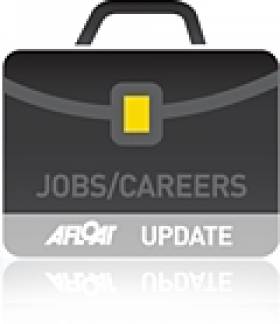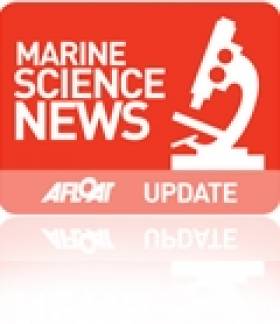Displaying items by tag: SmartOcean
Ireland & Northern Ireland To Become Centre Of Excellence For Marine ICT
#MarineScience - The SmartOcean Forum taking place at Titanic Belfast over the next two days (5-6 November) aims to establish Northern Ireland and Ireland as leaders in the development of ICT products and services for global marine sectors.
The Invest Northern Ireland-sponsored event will focus on developing high-tech products and services for traditional sectors such as fisheries, aquaculture, transport and security and emerging sectors such as renewable ocean energy and environmental monitoring, and ocean observation.
The forum will give insights on emerging markets, policy and opportunities for innovation associated with the launch of Horizon 2020 in 2014 and will focus on the challenges for SMEs to drive innovation in an emerging marine technology sector. It will also explore initiatives and investment for capacity build to develop a marine ICT sector here that can derive economic benefits from our ocean.
There are a number of opportunities emerging through local and international initiatives and we need to be in a position to work with Atlantic partners in the sustainable development of our ocean resource.
NI Minister of Enterprise Trade and Investment, Arlene Foster, said: “Today’s SmartOcean forum follows our recent Northern Ireland Investment Conference which successfully highlighted to an international business audience the strengths that we have to offer.
"Programmes like SmartOcean allow us to continue building on our traditional strengths of engineering excellence and our long history of innovation, whilst developing new skill sets to meet the needs of the fast changing world of technology and renewable energy, and with it bringing real opportunities for economic growth and development.
Minister Foster added that her department "has been leading on the development of the Northern Ireland Innovation Strategy. Fundamental to this strategy is the concept of open innovation and collaboration. The rapid rise of innovation in technology and the emerging opportunities coming from the marine sector offers considerable scope and opportunities for those companies who are willing to finding new innovative ways of working and developing.”
Meanwhile, Maire Geoghegan Quinn, EU Commissioner for Research & Innovation, highlighted the "strong convergences between SmartOcean and our plans for ocean-related research and innovation in Horizon 2020, the EU’s new research and innovation programme.
"By bringing together the best ICT experts, marine technology providers and marine scientists in Ireland, the SmartOcean cluster has created the right innovation environment to harvest the potential of the blue economy. Research and innovation are essential to unlock the potential of marine energy and the marine bio-economy and to use deep-sea resources in a sustainable way.”
The SmartOcean Forum aims to build on the Atlantic Ocean Research Alliance between the EU, United States and Canada, launched at the Marine Institute in Galway last May.
A goal of the alliance is to develop a transatlantic ocean observation system which will increase our understanding of the oceans and promote ocean innovation through improved access to a broad range of ocean data.
Marine Institute chief executive Dr Peter Heffernan, who opened the forum, said: “Our ocean territory is our greatest natural resource and the need to understand and manage it has never been greater.
"We have a huge opportunity to lead the way in marine ICT to support the sustainable development of our ocean resource. And we are steadily working towards the targets set out in [the Irish] Government’s Harnessing Our Ocean Wealth - An Integrated Marine Plan for Ireland to ensure that our ocean wealth will be a key component of our economic recovery and sustainable growth, generating social, cultural and economic benefits for all citizens."
Other speakers at the event include Dr Gilles Ollier, head of sector for earth observation and director general for research and innovation with the European Commission; Karen Skinner of the Atlantic Canada Opportunities Agency; and Suzanne Kelly, deputy director of the US Integrated Ocean Observing System programme with the NOAA; while representatives from Microsoft, SAP, Cathx Ocean and Magnet Networks will give keynotes.
#MARINE JOBS – As the festivities of the Volvo Ocean Race gain further momentum following this morning's final offshore race leg to Galway Harbour, the Marine Institute and SmartOcean Ireland are also to be present during the prestigious event as they are to host 'Oceans of Opportunity'.
Oceans of Opportunity, is a marine careers and training event (held this Thursday 5th and Friday 6th July) which is part of the Ocean Wealth Showcase at the Volvo Ocean Race Global Village. More than 80 Irish-based marine jobs will be on offer at the event and over 140 international opportunities.
A wide variety of marine jobs will be on offer at the event with a number of organisations (across shipping, technology, research, energy, and cruise line hospitality) actively recruiting over the two days. Information on the current opportunities will also be available on www.marinejobs.ie which will be launched this Thursday.
Speaking ahead of the event Dr Peter Heffernan, CEO Marine Institute said "This event highlights the wide variety of job opportunities that are available right now in the marine sector. It will be a great opportunity for those looking for a position in this area to meet with recruiters at the event.
For those who are just thinking about a career in the marine sector, it will be a chance to get some insight into the wide variety of opportunities available, including in maritime education and training".
Among those recruiting at the event are DCU (MSc, PhD, PostDoc positions), IBM (technical and engineering), Marine Institute (graduate opportunities) and the Chamber of Shipping. Experienced HR specialists will be on hand to provide advice on preparing for a career in the marine sector.
The Marine Institute and the Irish Maritime Development Office (IMDO) will also be offering marine career advice, job opportunities, CV workshops and clinics to support and advise job seekers looking to work in the marine sector.
A series of short talks are also scheduled throughout this Thursday, giving 'a day in the life' insight into the variety of careers that are available in the marine sector. For information on the schedule visit www.marine.ie or www.marinejobs.ie
Companies who wish to promote job opportunities on www.marinejobs.ie should contact [email protected]
Taoiseach Announces Marine Jobs On Visit of RV Celtic Explorer
An Taoiseach Enda Kenny visited the Marine Institute's research vessel RV Celtic Explorer in Dublin Port today, where he announced the creation of 92 jobs in the marine sector, writes Jehan Ashmore.
"Ireland is now recognised as an emerging power in Marine Research and Innovation," said the Taoiseach. Of the new positions, 64 will be generated in the seafood processing sector. This follows a €3.5m Seafood Processing Business Investment Scheme administered by Bord Iascaigh Mhara (BIM). In the area of marine research, 28 jobs have been created through funding of €2m from an International SmartOcean Graduate Programme.
SmartOcean is a collaboration between IRCSET (Irish Research Council for Science Engineering and Technology), the Marine Institute, five Irish universities and key multinationals and SME Information and Communication Technology (ICT) companies to provide funding for 28 research posts.
The Taoiseach said: "This has been achieved through the mapping of the 90% of Irish national territory that lies under the Atlantic, the creation of a quarter of a billion Euros worth of marine research infrastructure, and the fostering of strong linkages between industry and research centres, all of which will support employment opportunities in key areas of potential growth in the marine sector."
During the tour of the RV Celtic Explorer, the Taoiseach who was accompanied by Minister for Agriculture, Marine and Food, Simon Coveney, welcomed the expansion of Ireland's capabilities in the international shipping services sector, which is expected to attract additional jobs to the country.
Ireland's emerging international shipping services sector has continued to grow, underpinned by a number of investments in new and second hand ships over the last twelve months by such companies as Arklow Shipping and the Mainport Group, as well as foreign direct investments by D'Amico and Ardmore shipping.
As reported on Afloat.ie, RV Celtic Explorer had arrived yesterday into Dublin Port, having completed a fisheries demersal survey which started in Galway on 23 September. Initially she had docked at Ocean Pier but she subsequently shifted berths to Sir John Rogersons Quay for today's reception of An Taoiseach. According to her survey schedule she is due to depart tomorrow on a herring acoustic survey which is to take place in the Celtic Sea and off the south-west coast.
- Dublin Port
- BIM
- Marine Institute
- marine science
- Arklow Shipping Ltd
- Bord Iascaigh Mhara
- Ports and Shipping News
- Ardmore Shipping
- Mainport Group
- D'Amico
- Irish marine jobs
- An Taoiseach Enda Kenny
- SmartOcean
- RV Celtic Explorer
- RV Celtic Voyager
- Sir John Rogersons Quay
- Irish research vessels
- Simon Coveney





























































